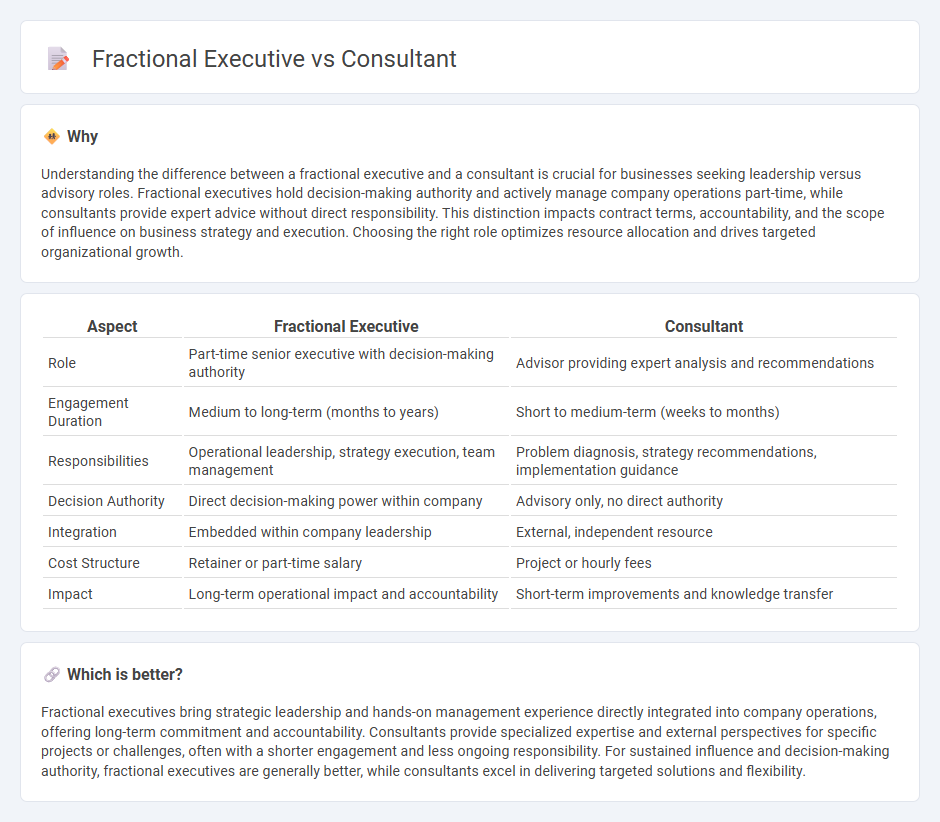
Fractional executives offer part-time leadership with decision-making authority, directly influencing company strategy and operations. Consultants provide expert advice and recommendations without taking on ongoing managerial responsibilities. Explore the differences to determine which option aligns best with your business goals.
Why it is important
Understanding the difference between a fractional executive and a consultant is crucial for businesses seeking leadership versus advisory roles. Fractional executives hold decision-making authority and actively manage company operations part-time, while consultants provide expert advice without direct responsibility. This distinction impacts contract terms, accountability, and the scope of influence on business strategy and execution. Choosing the right role optimizes resource allocation and drives targeted organizational growth.
Comparison Table
| Aspect | Fractional Executive | Consultant |
|---|---|---|
| Role | Part-time senior executive with decision-making authority | Advisor providing expert analysis and recommendations |
| Engagement Duration | Medium to long-term (months to years) | Short to medium-term (weeks to months) |
| Responsibilities | Operational leadership, strategy execution, team management | Problem diagnosis, strategy recommendations, implementation guidance |
| Decision Authority | Direct decision-making power within company | Advisory only, no direct authority |
| Integration | Embedded within company leadership | External, independent resource |
| Cost Structure | Retainer or part-time salary | Project or hourly fees |
| Impact | Long-term operational impact and accountability | Short-term improvements and knowledge transfer |
Which is better?
Fractional executives bring strategic leadership and hands-on management experience directly integrated into company operations, offering long-term commitment and accountability. Consultants provide specialized expertise and external perspectives for specific projects or challenges, often with a shorter engagement and less ongoing responsibility. For sustained influence and decision-making authority, fractional executives are generally better, while consultants excel in delivering targeted solutions and flexibility.
Connection
Fractional executives and consultants both provide specialized expertise to businesses on a temporary or part-time basis, enabling companies to access high-level skills without the commitment of full-time employment. Fractional executives typically take on leadership roles within the organization, such as CFO or CMO, contributing directly to strategic decision-making and operational management. Consultants focus on analyzing problems, offering recommendations, and implementing solutions, often advising multiple clients across various industries to improve efficiency and drive growth.
Key Terms
Scope of Responsibility
Consultants typically provide specialized expertise and advisory services within a limited scope, often addressing specific projects or challenges without direct oversight of daily operations. Fractional executives assume broader responsibilities, including strategic decision-making and leadership roles, while managing key functions part-time to align with company goals. Explore further differences to determine which role best fits your organizational needs.
Decision-Making Authority
Consultants provide expert advice and recommendations without direct decision-making power, while fractional executives hold formal leadership roles with the authority to make strategic decisions within an organization. Fractional executives actively participate in company operations and are accountable for implementing changes and achieving business outcomes. Discover how each role impacts your organization's growth and governance by exploring their distinct responsibilities.
Engagement Structure
Consultants typically engage on a project basis, providing specific expertise for limited durations without direct responsibility for ongoing operational decisions. Fractional executives integrate into the leadership team part-time or interim, taking ownership of strategic initiatives and long-term business outcomes within a defined scope. Explore the distinctions in engagement structures to determine the best fit for your organizational needs.
Source and External Links
Consultant - Wikipedia - A consultant is a professional expert who provides specialized advice or services, often helping businesses by diagnosing and transforming problems into workable solutions within a specific field.
What Is a Consultant? Definition and How To Become One - Indeed - A consultant is an experienced professional with broad and in-depth knowledge of a particular subject who advises clients in various sectors, either internally or externally, to improve business performance.
Consulting job description - TargetJobs - Consultants help organizations manage change, solve problems, and improve efficiency by researching, analysing, and recommending strategies to enhance operations, often working long hours and closely with clients across many specialisms.
 dowidth.com
dowidth.com